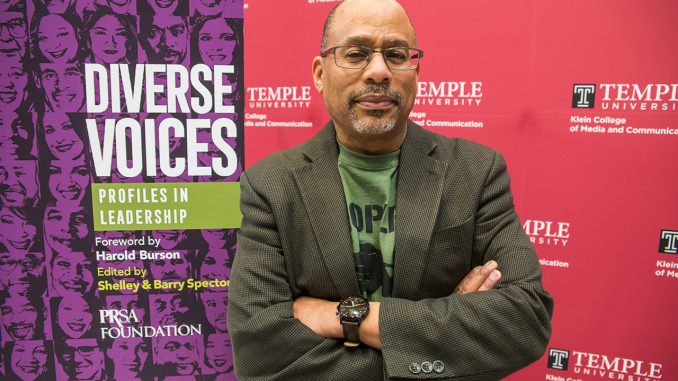
Lailumah Faisal regularly notices she is the only intern of color at her public relations internships — and sometimes the only person of color in the whole office.
“There have been a lot of conversations of ‘We should,’ but no one knows where to start or where to find diverse students to recruit,” said Faisal, a senior public relations major of Pakistani descent. “It’s not that there’s a lack of [candidates]. It’s that employers don’t know.”
Faisal’s experience inspired her to participate in the Bateman Competition, hosted by the Public Relations Student Society of America in partnership with the Public Relations Society of America. Students nationwide created and implemented a diversity-focused PR campaign for the month-long, annual competition that ended Monday.
Faisal, along with fellow senior PR majors Christina Borst, Erica DeAngelo, Rose McBride and Mary Kate O’Malley and their professor David Brown, held a series of lectures encouraging diversity in PR for Klein’s undergraduate Introduction to PR and PR Theory classes for the competition.
O’Malley and Brown led the lectures, which the team hoped would reinforce the idea that successful, diverse professionals can enter the PR field, connecting future students of color with professionals to look up to.
“The crux of our campaign has been centered around education, and a lot of it has also been about activating student allies because they hold power to create change for the future of this field,” McBride said.
The PR field has a problem recruiting and retaining racially diverse candidates. Data from the Bureau of Labor Statistics from 2018 found that nearly 87 percent of PR specialists are white, while 10 percent are Hispanic or Latinx, 7 percent are African-American and 5 percent are Asian.
“When you teach about an off-topic, like diversity, it becomes more than a classroom lesson, it becomes a life lesson,” Brown added. “It’s about helping others find their voice, staying true to themselves and having their story told.”
The team competed against more than 75 other student teams from across the country. The Temple teammates divided campaign responsibilities, like writing press releases, running social media and overseeing data collection, among themselves. While judging has not yet happened, teams will be evaluated on how well they researched, planned and executed their campaigns through portfolios submitted to the judges.
In addition to the initial campaign, participating teams had to promote “Diverse Voices: Profiles in Leadership,” a book featuring interviews from more than 30 diverse PR leaders. Temple University’s team created a book club, funded by accomplished Philadelphia PR professionals, for students to discuss the text.
“It’s really the first of its kind because it starts that dialogue,” Faisal said. “The book allows opportunities to start a dialogue on this conversation that a lot of people don’t get the opportunity to have.”
Faisal believes the voluntary nature of the competition shows the team’s dedication to the issue.
“I really appreciate everyone on this team because of that fact that we don’t have to be here, we don’t have to be doing this, but because we care so much at this point it shows there’s hope for the future,” Faisal said.
Though the campaign lasted a month, Brown and his students want to encourage its message year round.
The team placed copies of “Diverse Voices” in Paley Library and held faculty presentations in Temple’s Office of Institutional Diversity, Equality, Advocacy and Leadership to instruct PR faculty on how to teach about and discuss diversity on campus.
Despite Philadelphia’s diversity, Temple was the only university in the city to participate in the competition, which Brown calls “a blessing and a curse.”
“The blessing is that we’re the only ones doing it,” he said. “But the curse is that a lot of colleges and universities haven’t had the courage to participate.”
DeAngelo hopes the campaign can encourage continual discussions about diversity in the field.
“We all bring something different to the table, but that sometimes means that our experiences and perspectives are limited,” DeAngelo said. “It’s important that we’re making sure people who come from these backgrounds and experiences have power and the ability to tell their stories.”



Be the first to comment